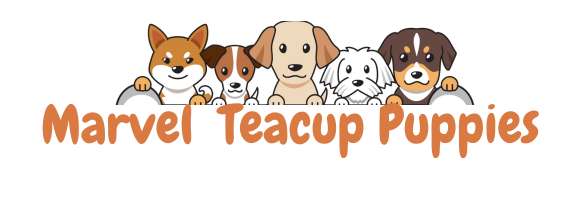Best Teacup Puppy Breeds: Top 8 Tiny Companions
Tiny Paws, Big Hearts: Navigating the World of Teacup Pups
Thinking about a teacup puppy? These pint-sized companions require special care and consideration. This list explores eight popular teacup breeds—Chihuahua, Pomeranian, Yorkie, Maltese, Poodle, Shih Tzu, Bichon Frise, and Pug—covering their unique traits, potential health issues, and essential care needs. Make an informed choice and ensure a happy, healthy life for your future furry friend.
1. Teacup Chihuahua
The Teacup Chihuahua, a captivating miniature version of the standard Chihuahua, has charmed its way into many hearts. It's important to understand that "teacup" isn't an official breed designation, but rather a term used to describe exceptionally small Chihuahuas, typically weighing under 3 pounds and standing about 6 inches tall. These petite pups are bred for their diminutive size, retaining the bold and alert temperament of their standard counterparts in an even more compact form. This makes them particularly appealing to individuals with limited living space or those seeking an ultra-portable companion.
These tiny dynamos possess a big personality packed into a tiny frame. They are known for their alertness, intelligence, and devotion to their owners. With a lifespan of 12-20 years when healthy, they can offer years of companionship. Teacup Chihuahuas come in a variety of coat types and colors, further adding to their appeal.
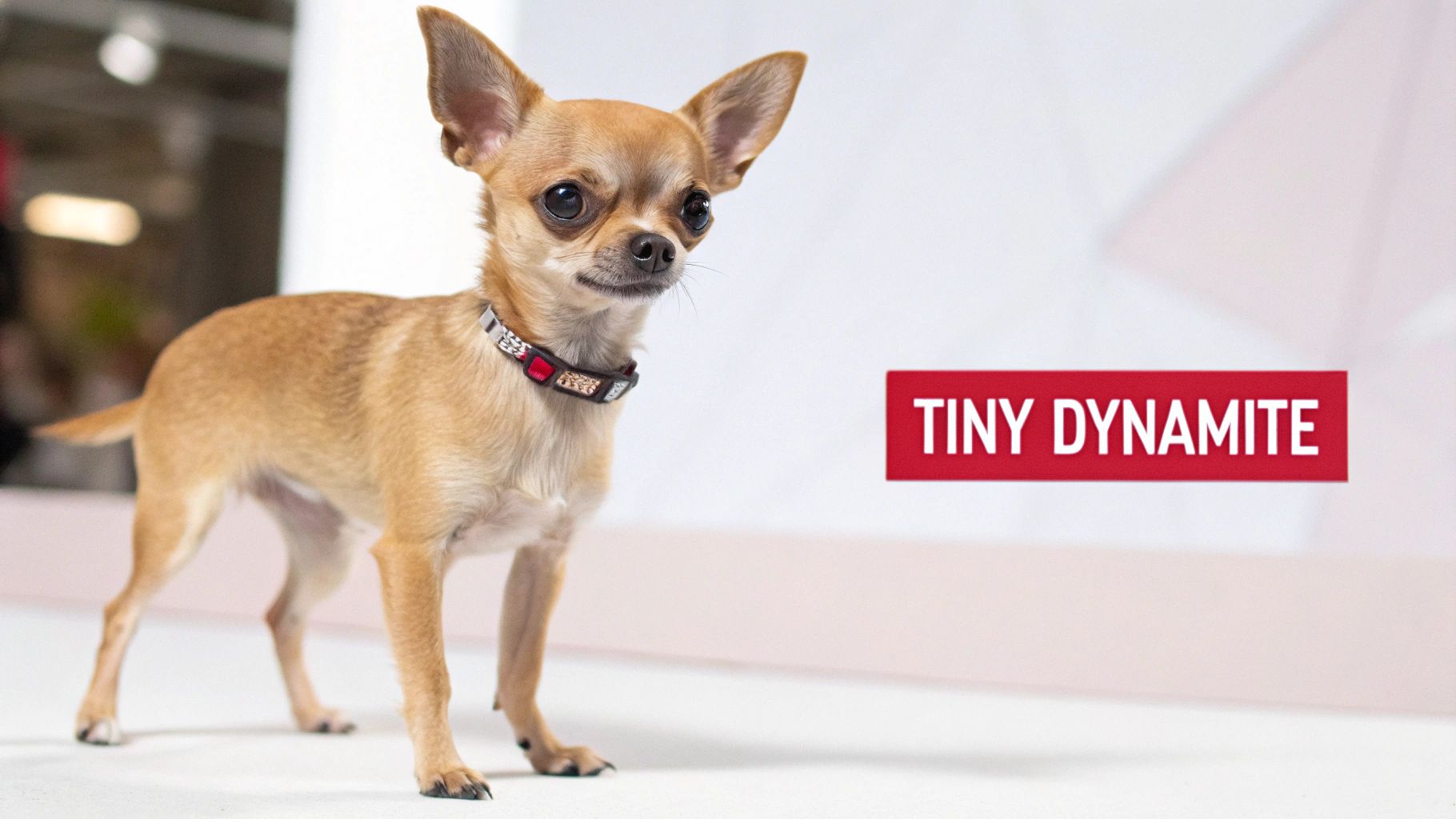
Their incredibly small size makes them exceptionally portable, easily fitting into small carriers for travel. This portability, coupled with their minimal exercise requirements, makes them well-suited to apartment living. Their small stature also translates to lower food consumption. However, it's crucial to be aware of the potential health challenges associated with teacup-sized dogs. Learn more about Teacup Chihuahua for a deeper understanding of the breed.
While their diminutive size and charming personalities are undeniably attractive, potential owners should carefully consider the responsibilities that come with owning such a fragile dog. Teacup Chihuahuas are prone to a range of health issues, including hypoglycemia (low blood sugar), heart problems, and hydrocephalus (fluid buildup in the brain). They are also often more expensive than standard Chihuahuas due to the specialized breeding practices involved. Housebreaking can be challenging, and they can sometimes be intolerant of children and other pets. Improper training can lead to "small dog syndrome," where the dog exhibits behavioral problems due to a lack of consistent boundaries.
Pros:
- Highly portable and travel-friendly
- Minimal exercise needs
- Adaptable to apartment living
- Devoted and loyal companions
- Low food consumption
Cons:
- Fragile health and potential medical issues
- Higher purchase price
- Prone to hypoglycemia, heart problems, and hydrocephalus
- Difficult to housebreak
- Potential intolerance towards children and other pets
- Risk of developing "small dog syndrome"
Tips for Teacup Chihuahua Owners:
- Careful Handling: Their tiny size makes them susceptible to injury, so gentle handling is essential.
- Frequent Meals: Small, frequent meals are necessary to prevent hypoglycemia.
- Harnesses over Collars: Use a harness instead of a collar to protect their delicate trachea.
- Dental Care: Prioritize dental care as they are prone to dental issues.
- Warm Clothing: Provide warm clothing in cold weather due to their difficulty regulating body temperature.
The Teacup Chihuahua earned its place on this list due to its undeniable charm and portability. However, prospective owners must be fully prepared for the commitment and specialized care required to ensure the health and well-being of these delicate companions. The popularity of these tiny dogs was fueled in part by celebrities like Paris Hilton, Reese Witherspoon, and Mickey Rourke, especially during the early 2000s, contributing to their presence in media and popular culture.
2. Teacup Pomeranian
The Teacup Pomeranian, a pocket-sized version of the already diminutive Pomeranian, has captured the hearts of many with its adorable appearance and lively personality. These pint-sized pups are selectively bred to be smaller than standard Pomeranians, typically weighing between a mere 2-4 pounds and standing 6-8 inches tall. Don't let their small stature fool you; they possess all the charm, intelligence, and boldness of their larger counterparts, condensed into an even more portable package. Their signature fox-like face, bright, alert expression, and profuse, fluffy double coat contribute to their undeniable appeal.
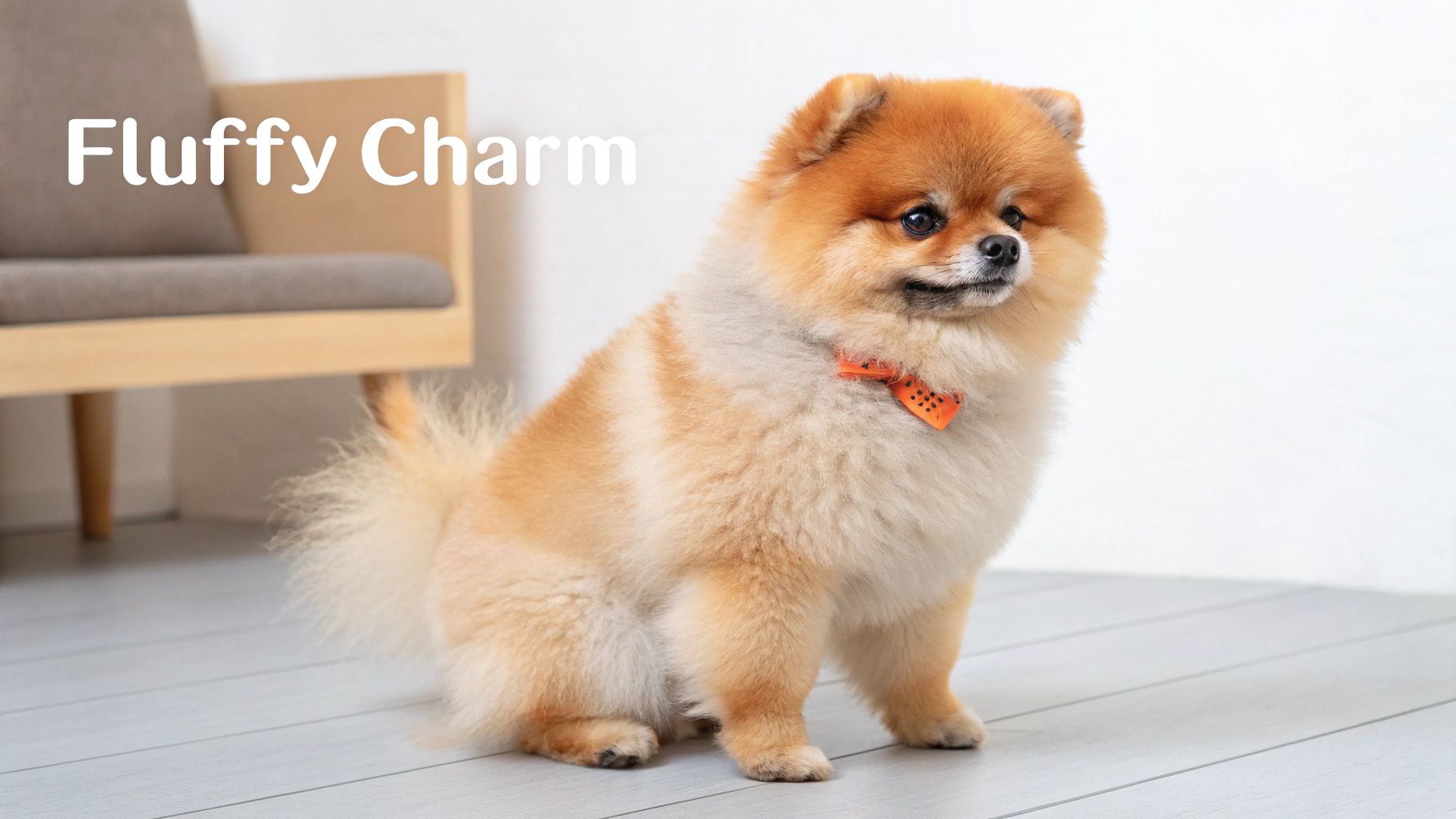
The Teacup Pomeranian earns its spot on the "best teacup puppy breeds" list due to its unique blend of portability, personality, and captivating looks. Their small size makes them incredibly travel-friendly, easily fitting into carriers and adapting well to apartment living. Despite their diminutive frame, they are surprisingly intelligent and can be trained with consistent positive reinforcement. Their playful and entertaining nature, coupled with an alert disposition, makes them excellent companions and even effective (albeit tiny) watchdogs. Examples of this breed's captivating personality include Boo, "The World's Cutest Dog," who amassed over 16 million Facebook followers, and Jiff the Pomeranian, a social media star and Guinness World Record holder. These examples highlight the breed's potential for both companionship and entertainment.
Features:
- Fluffy double coat requiring regular grooming
- Fox-like facial features
- Weight typically between 2-4 pounds
- Intelligent and alert expression
- Bold, confident personality despite tiny size
Pros:
- Extremely portable and travel-friendly
- Intelligent and trainable for their size
- Entertaining and playful throughout their lives
- Alert nature makes them good tiny watchdogs
- Beautiful, distinctive appearance
Cons:
- Significant grooming requirements with daily brushing needed
- Prone to various health problems due to size
- Can be vocal and prone to excessive barking
- Stubborn streak can make training challenging
- Fragile and can be injured by rough handling
Tips for Teacup Pomeranian Owners:
- Establish a regular grooming routine: Daily brushing is essential to prevent matting and maintain the health of their luxurious double coat.
- Use positive reinforcement training consistently: While intelligent, their stubborn streak requires patience and consistent positive reinforcement methods.
- Provide sturdy furniture ramps: Their small size makes them prone to jumping injuries, so providing ramps can protect their delicate frames.
- Socialize early: Early socialization is crucial to prevent excessive fearfulness and ensure they develop into well-adjusted adults.
- Schedule regular dental checkups: Small breeds are often prone to dental issues, so regular checkups are vital for maintaining oral health.
The Teacup Pomeranian is a wonderful choice for individuals or families seeking a small, portable companion with a big personality. However, potential owners must be prepared for the commitment involved in caring for a breed with specific grooming and health needs. Careful consideration of the pros and cons, along with a dedication to responsible ownership, will ensure a happy and healthy life for these charming miniature companions.
3. Teacup Yorkie
The Teacup Yorkshire Terrier, a miniaturized version of the standard Yorkshire Terrier, is a truly pocket-sized companion. These diminutive dogs typically weigh between 2 and 4 pounds and stand a mere 5-7 inches tall. Don't let their size fool you; they possess the same confident, even feisty, personality as their larger counterparts, along with the signature long, silky coat. Originally bred to control rat populations in the textile mills of Yorkshire, England, these tiny terriers have transitioned into cherished companion animals, perfectly suited for those seeking a small pet with a big personality.
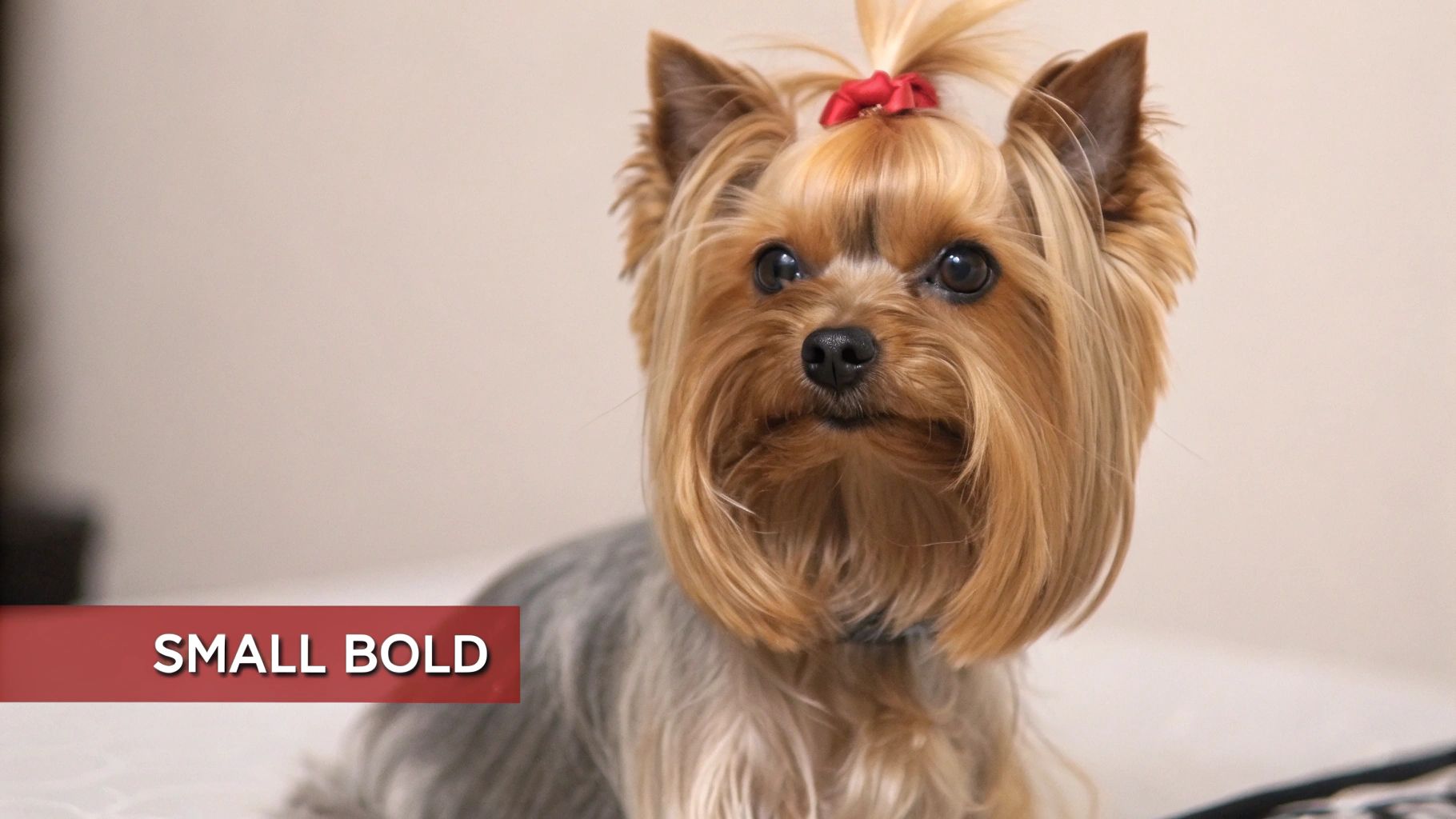
The Teacup Yorkie earns its place on this list due to its incredibly small size, making it ideal for apartment living and easy transportation. Their low-shedding coat is a boon for individuals with mild allergies. This breed is characterized by a long, silky coat that feels more like human hair than fur, a compact body with erect ears, and a docked tail (practiced in some countries). Their distinctive blue and tan or black and gold coloration adds to their charm. Learn more about Teacup Yorkie to understand the breed in more detail. It's important to research reputable breeders and understand the ethical considerations surrounding teacup breeding.
Pros:
- Minimal Shedding: Ideal for allergy sufferers.
- Portability: Easily carried in small bags or carriers.
- Adaptable: Thrives in various living situations, especially apartments.
- Affectionate and Loyal: Forms strong bonds with their owners.
- Alert: Makes surprisingly good tiny watchdogs.
Cons:
- Fragile Health: Prone to numerous health issues due to their size.
- Delicate Bones: Susceptible to fractures.
- Constant Supervision Required: Must be protected from children and larger pets.
- Difficult to Housebreak: Patience and consistency are key.
- High Maintenance Grooming: Requires regular brushing and professional grooming.
Examples in Popular Culture:
Audrey Hepburn's beloved Yorkshire Terrier, Mr. Famous, frequently appeared in her photoshoots, showcasing the breed's glamorous side. More recently, Sylvester Stallone has featured his teacup Yorkie on social media. These examples, while showcasing the breed's popularity, shouldn't overshadow the commitment involved in their care.
Tips for Teacup Yorkie Owners:
- Accessibility: Use pet steps or ramps to help them reach furniture.
- Nutrition: Feed high-quality food formulated specifically for toy breeds.
- Dental Care: Brush their teeth regularly to prevent dental problems, a common issue in small breeds.
- Housebreaking: Consider using puppy pads, particularly during inclement weather.
- Grooming: Learn to groom your Yorkie at home or budget for professional grooming every 4-6 weeks.
The Teacup Yorkie is an appealing companion for the right owner. However, prospective owners must be prepared for the commitment and specialized care these delicate dogs require. Their small size brings with it increased health risks and the need for constant vigilance. With proper care, attention, and a lot of love, a Teacup Yorkie can bring years of joy to a dedicated owner.
4. Teacup Maltese
The Teacup Maltese, a pocket-sized version of the already diminutive Maltese, is a breed specifically bred for its exceptionally small size. While the standard Maltese is considered a toy breed, Teacup Maltese are even tinier, typically weighing between a mere 2-4 pounds and standing only 4-6 inches tall. These petite pups are characterized by their luxurious, flowing white coats, endearing black button noses, and expressive dark eyes, embodying elegance in a truly miniature package. Their sweet-tempered and affectionate nature makes them highly sought after by individuals seeking a constant, loving companion who can easily fit in a purse. It's this unique combination of diminutive size and loving personality that earns the Teacup Maltese a spot on our list of best teacup puppy breeds.
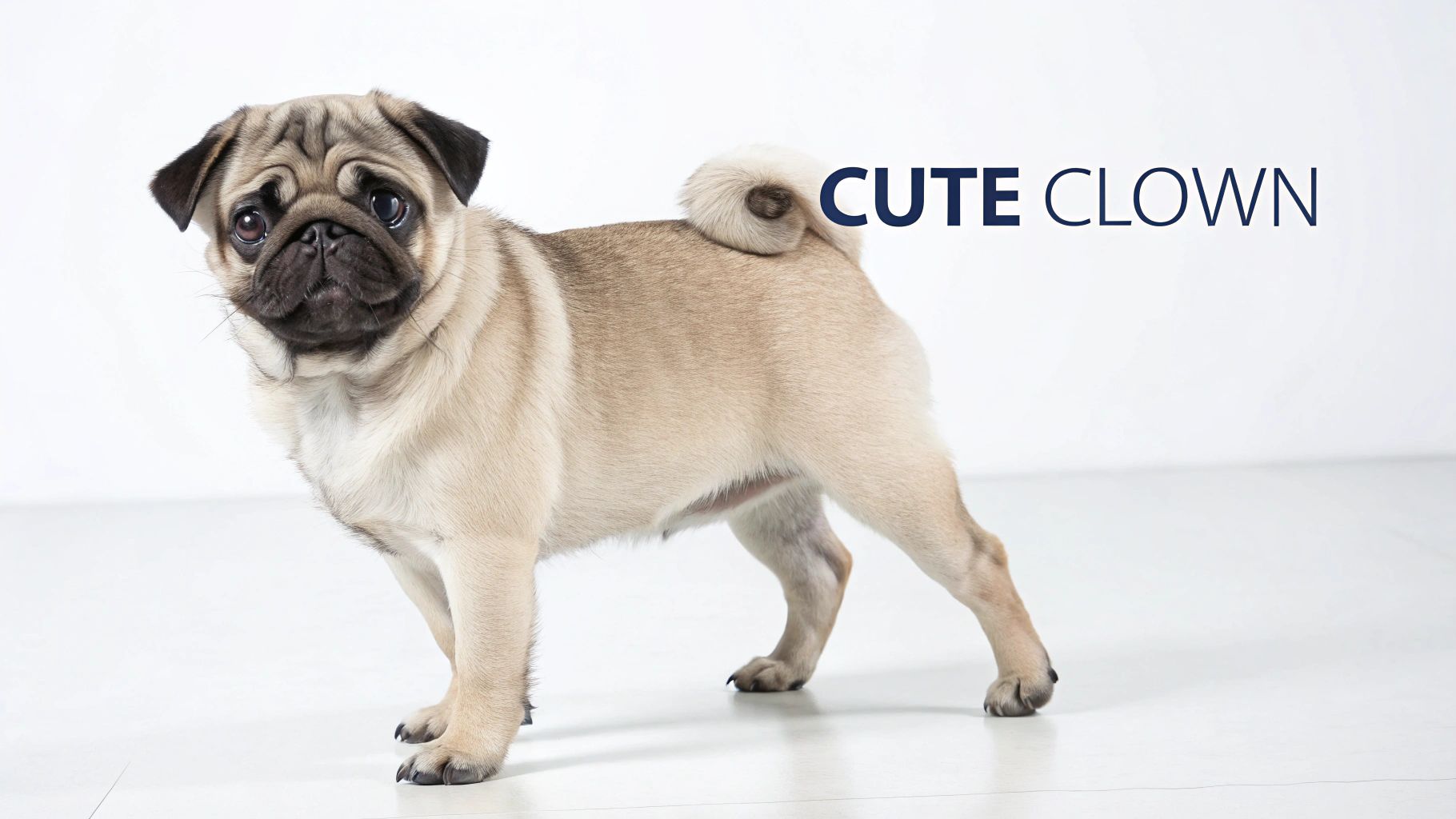
The Teacup Maltese boasts several distinguishing features. Their pure white, silky coat, devoid of an undercoat, gives them a glamorous appearance, while their small, compact bodies move with surprising grace. Their gentle, affectionate temperament is a hallmark of the breed, making them ideal lap dogs. Though not truly hypoallergenic, their non-shedding coat is a benefit for allergy sufferers. This breed's popularity has been cemented by celebrity owners like Elizabeth Taylor, Halle Berry, and Jessica Simpson, who have all fallen for the Maltese's charm.
Pros:
- Generally sweet and gentle disposition: Teacup Maltese are known for their affectionate and loving personalities, making them excellent companions for individuals and families alike.
- Adaptable to apartment living: Their small size makes them well-suited to apartment life, requiring minimal space for exercise and play.
- Forms strong bonds with owners: Teacup Maltese are known to be deeply devoted to their owners and thrive on close companionship.
- Less 'yappy' than some other teacup varieties: While all dogs bark, Teacup Maltese are generally less prone to excessive barking compared to some other teacup breeds.
- Relatively intelligent and trainable for their size: Despite their small stature, they are surprisingly intelligent and can be trained with positive reinforcement methods.
Cons:
- High-maintenance coat requiring daily grooming: Their beautiful, silky coat requires daily brushing to prevent matting and tangles.
- Prone to tear staining around eyes: The white fur around their eyes is susceptible to staining from tears, requiring regular cleaning.
- Often develop dental problems due to tiny mouths: Their small mouths can lead to overcrowding of teeth and increased risk of dental disease.
- Can suffer from separation anxiety: Due to their strong attachment to their owners, they can be prone to separation anxiety when left alone for extended periods.
- Fragile health with numerous potential issues: Like many teacup breeds, they can be susceptible to various health problems due to their small size, including hypoglycemia, fragile bones, and respiratory issues. It's crucial to prioritize ethical breeders who prioritize health and well-being over extreme miniaturization.
Tips for Teacup Maltese Owners:
- Use tearless shampoo specifically formulated for white coats to maintain their pristine appearance.
- Clean their face daily with a damp cloth to prevent tear staining.
- Maintain regular professional grooming every 4-6 weeks for coat trimming and bathing.
- Provide proper dental care, including daily brushing and dental treats, to prevent dental issues.
- Use positive reinforcement training methods consistently to build a strong bond and encourage good behavior.
- Consider crate training to help manage separation anxiety and provide a safe space for your pet.
- Research reputable breeders carefully and prioritize health testing to minimize the risk of inherited health problems.
The Teacup Maltese is a wonderful companion for the right owner prepared to meet their specific needs. Their loving nature and diminutive size make them appealing, but potential owners must be aware of the breed's specific health and grooming requirements. By understanding the commitment involved and prioritizing responsible breeding practices, you can ensure a long, happy, and healthy life for your Teacup Maltese.
5. Teacup Poodle
The Teacup Poodle, a truly diminutive version of the Toy Poodle, captures hearts with its miniature size and charming personality. While "Teacup" isn't an officially recognized size by major kennel clubs like the American Kennel Club (AKC), the term generally refers to Poodles weighing under 4 pounds and standing less than 9 inches tall. These tiny dogs inherit the intelligence, hypoallergenic coat, and elegant appearance of their larger Standard, Miniature, and Toy Poodle relatives, making them an appealing choice for those desiring an extremely small yet intelligent companion.
Teacup Poodles deserve a spot on this list due to their unique combination of portability, intelligence, and hypoallergenic qualities. They are well-suited to apartment living and can even participate in dog sports tailored to smaller breeds, showcasing their surprising agility and trainability. Their curly, low-shedding coat makes them a good option for individuals with allergies.
Key Features and Benefits:
- Curly, Hypoallergenic Coat: This distinctive coat requires regular grooming but minimizes shedding, benefiting allergy sufferers.
- Exceptional Intelligence and Trainability: Teacup Poodles are quick learners, excelling in obedience training and even tricks.
- Compact Size: Their small stature makes them ideal for apartment living and easy to travel with.
- Elegant Appearance: They maintain the classic Poodle elegance in a miniature package, available in various colors like white, black, apricot, and silver.
Pros:
- Minimal shedding, ideal for allergy sufferers.
- High intelligence and trainability.
- Adaptable to apartment living.
- Can participate in dog sports like agility.
- Potential for a longer lifespan than some other teacup breeds when healthy.
Cons:
- Requires regular professional grooming every 4-6 weeks to prevent matting.
- Prone to numerous health issues due to miniaturization; this includes but isn't limited to hypoglycemia, tracheal collapse, patellar luxation, and heart problems.
- Can be high-strung and develop anxiety if not properly socialized from a young age.
- Typically comes with a higher price tag compared to other small breeds.
- Extremely fragile physical structure; extra care must be taken to prevent injuries.
Examples:
Teacup Poodles are gaining popularity in various arenas:
- Mini Agility Competitions: Their intelligence and agility allow them to excel in these adapted competitions.
- Social Media Stars: Their adorable size and elaborate grooming styles make them social media sensations.
Tips for Teacup Poodle Owners:
- Consistent Grooming: Schedule professional grooming every 4-6 weeks to prevent painful matting and skin issues.
- Mental Stimulation: Provide puzzle toys, regular training, and interactive play to keep their intelligent minds engaged.
- Pet Insurance: Consider pet insurance due to the increased risk of health problems associated with miniaturization.
- Positive Reinforcement Training: Use positive reinforcement methods for effective and humane training.
- Dental Care: Small breeds are prone to dental issues; establish a regular dental care routine early.
Popularized By:
Historically, the standard and miniature poodle have been favored by iconic figures like Jackie Kennedy, Walt Disney, and Elizabeth Taylor. While Marilyn Monroe owned larger poodles, her affection for the breed contributed to their overall popularity, indirectly influencing the desire for smaller variations like the Teacup Poodle.
It's crucial to remember that while undeniably adorable, the Teacup Poodle's small size comes with inherent health risks. Ethical breeding practices and careful consideration of these potential challenges are paramount when deciding to welcome a Teacup Poodle into your home. Always prioritize reputable breeders who prioritize the health and well-being of their dogs over extreme miniaturization.
6. Teacup Shih Tzu
The Teacup Shih Tzu, a miniaturized version of the already small standard Shih Tzu, offers an undeniably appealing package for those seeking a truly tiny companion. These pocket-sized pups typically weigh between a mere 3-5 pounds and stand only 5-7 inches tall at the shoulder. Their diminutive stature, combined with the breed's signature long, flowing coat and endearing flat face, makes them a popular choice for apartment living and individuals looking for a highly portable pet. However, prospective owners should be fully aware of the specific needs and potential health concerns that accompany this miniaturization.
The Teacup Shih Tzu retains many of the characteristics that make the standard Shih Tzu beloved. Their luxurious double coats come in a dazzling array of colors and patterns, while their large, expressive eyes and short muzzles contribute to their perpetually puppy-like appearance. Bred originally as companions for Chinese royalty, these dogs maintain a regal air despite their tiny size. Their temperament is generally friendly and outgoing, often exhibiting a playful and affectionate nature. They are known for being adaptable to various living situations, from bustling households to quiet apartments, and are generally less yappy than other small breeds, making them suitable companions for apartment dwellers.
Celebrities like Mariah Carey (whose teacup Shih Tzus have graced her social media) and Nicole Richie (with her Shih Tzu, Honeychild) showcase the breed's popularity. Other notable figures like Beyoncé, Colin Farrell, and even Bill Gates have been associated with the Shih Tzu breed, further solidifying its place in popular culture.
Pros:
- Friendly and good with children: When properly socialized, Teacup Shih Tzus are typically gentle and playful with children.
- Less yappy: Compared to other small breeds, they are generally quieter.
- Adaptable: They can thrive in various living environments.
- Affectionate and loving: They are known for their loving and devoted personalities.
- Less high-strung: They tend to be calmer than some other teacup varieties.
Cons:
- Brachycephalic issues: Their flat face predisposes them to breathing difficulties, eye problems, and overheating.
- High-maintenance coat: Daily grooming is essential to prevent matting and tangles.
- Prone to overheating: Their short muzzle makes it difficult for them to regulate their body temperature in hot weather.
- Can be stubborn during training: Patience and positive reinforcement are crucial during training.
- More health issues than standard Shih Tzus: The selective breeding for smaller size can amplify certain health risks.
Tips for Teacup Shih Tzu Owners:
- Climate Control: Keep your Teacup Shih Tzu in air-conditioned environments, especially during hot and humid weather.
- Grooming: Maintain a short "puppy cut" grooming style to minimize maintenance. Regularly clean their face folds to prevent skin infections.
- Elevated Food Bowls: Using elevated food bowls can ease the strain on their necks and backs while eating.
- Regular Vet Check-ups: Schedule regular veterinary check-ups with a focus on respiratory and overall health.
The Teacup Shih Tzu deserves its place on this list because it offers the quintessential "teacup" experience: diminutive size, adorable features, and a loving temperament. However, potential owners must be prepared for the commitment required to care for this delicate breed. Understanding the potential health risks associated with brachycephaly and the demands of their high-maintenance coat is crucial. With proper care, attention, and regular veterinary oversight, a Teacup Shih Tzu can be a rewarding and loving companion for many years.
7. Teacup Bichon Frise
The Teacup Bichon Frise is a miniaturized version of the standard Bichon Frise, selectively bred for its exceptionally small size. While already a small breed, the "teacup" variety pushes the boundaries of diminutiveness, typically weighing between a mere 3-5 pounds and standing only 6-8 inches tall. These tiny canines retain the signature characteristics of the standard Bichon Frise: a cloud-like puff of white fur, an endearingly cheerful expression highlighted by dark, expressive eyes, and a playful, affectionate personality. Their hypoallergenic coats and friendly nature make them highly appealing to individuals seeking an ultra-small, low-shedding companion brimming with charm.
The Teacup Bichon Frise's petite stature and charming demeanor have earned it a place among the most popular "teacup" breeds. Its hypoallergenic coat is a major draw for allergy sufferers, while its friendly disposition makes it a suitable companion for individuals and families alike. Historically favored by royalty and later popularized by celebrities like Doris Day, Barbara Streisand, and Sammy Davis Jr. (who famously doted on his Bichon), this breed has a long history of captivating hearts. Their photogenic qualities have even landed them roles in various television commercials.
Features and Benefits:
- Fluffy white hypoallergenic coat: A major advantage for allergy sufferers, requiring less frequent cleaning of pet hair from furniture and clothing.
- Distinctive contrast: Dark eyes and nose stand out against the pristine white coat, creating an irresistibly cute appearance.
- Cheerful expression: The round head and bright eyes contribute to a perpetually happy and engaging expression.
- Small size: Ideally suited for apartment living and easy to travel with.
- Playful and affectionate temperament: Makes them delightful companions for both individuals and families.
Pros:
- Minimal shedding: Reduces allergic reactions and minimizes cleaning.
- Happy and friendly disposition: Contributes to a positive and enjoyable companionship experience.
- Less prone to aggression: Compared to some other small breeds, they tend to be more gentle and even-tempered.
- Relatively good with children (with proper introduction): Their playful nature can make them good companions for respectful children.
- Adaptable to apartment living: Their small size makes them well-suited for smaller living spaces.
Cons:
- High-maintenance grooming: Their fluffy coat requires regular professional grooming and daily brushing to prevent matting.
- Prone to separation anxiety: Their strong attachment to their owners can lead to anxiety when left alone.
- Health concerns: Teacup Bichons are more susceptible to certain health issues than standard Bichons due to their size, including fragile bones and dental problems. Ethical breeding practices are crucial.
- Difficult to housebreak: Like many small breeds, they can be challenging to housetrain, requiring patience and consistency.
- Fragile physical structure: Their small size makes them delicate and prone to injury, requiring careful handling.
Tips for Teacup Bichon Frise Owners:
- Establish a regular professional grooming schedule every 4-6 weeks. This will help maintain their coat's health and prevent matting.
- Brush their coat daily. This helps to further prevent matting and distributes natural oils, keeping their coat healthy and shiny.
- Use positive reinforcement for housebreaking. Patience and consistency are key.
- Socialize them early and often. Expose them to different people, places, and sounds to prevent fearfulness and promote a well-adjusted temperament.
- Maintain dental hygiene through regular teeth cleaning. Small breeds are particularly prone to dental issues.
Choosing a Teacup Bichon Frise requires careful consideration. While their diminutive size and charming personality are undeniably appealing, potential owners must be prepared for the commitment involved in their care, particularly regarding grooming, training, and potential health concerns. Prioritizing ethical breeding practices is paramount when selecting a Teacup Bichon Frise to minimize the risks associated with miniaturization. By understanding the breed's specific needs and committing to responsible ownership, you can enjoy the immense joys of companionship with this adorable, fluffy friend.
8. Teacup Pug
The Teacup Pug, a miniaturized version of the standard Pug, packs all the charm and personality of its larger counterpart into a smaller package. Selectively bred for their diminutive size, these pups typically weigh under 8 pounds and stand 6-8 inches tall, compared to the 14-18 pounds of a standard Pug. They retain the signature flat, wrinkled face, curled tail, and expressive eyes that make Pugs so endearing, along with their playful and affectionate nature. This compact size makes them seemingly ideal for apartment living and appealing to those seeking a highly portable companion. Celebrities like Jessica Alba, whose pug Valentine frequently appears on her social media, have further popularized this tiny variation. You can often spot other examples of these pint-sized pups boasting thousands of followers on Instagram.
However, it's crucial to understand that achieving this miniature size often comes at a cost. The breeding practices used to create Teacup Pugs can exacerbate the health problems inherent to the breed, especially breathing difficulties related to their brachycephalic (flat-faced) features. Learn more about Teacup Pug to understand the intricacies of their breeding and potential health implications. This makes careful consideration and ethical sourcing paramount when considering a Teacup Pug.
Features:
- Flat, wrinkled face with large, expressive eyes
- Compact body with a curled tail
- Short, smooth coat in fawn or black
- Weight typically under 8 pounds
- Charming, clownish personality
Pros:
- Affectionate and devoted to their owners
- Generally good with children when properly socialized
- Compact size suitable for apartment living
- Minimal grooming needs compared to long-haired teacup breeds
- Playful and entertaining personality
Cons:
- Severe breathing difficulties due to exaggerated brachycephalic traits
- Extremely prone to eye injuries and infections
- Cannot tolerate heat or extensive exercise
- Prone to obesity despite their small size
- Multiple serious health concerns compared to standard Pugs
Tips for Teacup Pug Owners:
- Clean facial wrinkles daily: This helps prevent skin fold infections, a common issue in brachycephalic breeds.
- Maintain a cool environment: Teacup Pugs are highly susceptible to heatstroke. Keep them in air-conditioned spaces, especially during warm weather.
- Monitor breathing: Pay close attention to their breathing, especially during exercise or periods of stress.
- Use a harness, not a collar: Collars can put pressure on the trachea and exacerbate breathing problems. A harness distributes pressure more evenly and safely.
- Controlled feeding: Teacup Pugs are prone to obesity. Feed measured portions of high-quality food to maintain a healthy weight.
The Teacup Pug earns its place on this list due to its undeniable charm and portability. However, potential owners must be fully aware of the significant health risks associated with this breed. While their small size and affectionate nature are appealing, the increased susceptibility to serious health issues necessitates careful consideration and a commitment to providing specialized care. Prospective owners should prioritize ethical breeding practices and be prepared for the potential financial and emotional demands of caring for a dog with these specific needs. If you are looking for a low-maintenance, healthy small breed, a Teacup Pug may not be the best choice. However, for experienced owners willing to dedicate themselves to the specific needs of this tiny companion, the Teacup Pug can be a loving and rewarding addition to the family.
Top 8 Teacup Breeds: Quick Comparison
| Breed | 🔄 Complexity | ⚡ Resources | 📊 Outcomes | 💡 Use Cases | ⭐ Advantages |
|---|---|---|---|---|---|
| Teacup Chihuahua | High complexity due to delicate health and housing | Low exercise/food needs but high vet care | Ultra-portable companion with potential health issues | Apartment living, travel companion | Extremely small size with bold personality |
| Teacup Pomeranian | Moderate complexity with high grooming and training | Regular grooming and careful handling for fragile health | Playful, alert, and visually charming pet | Social media star, travel-friendly companion | Fluffy double coat and fox-like facial features |
| Teacup Yorkie | High complexity with significant grooming and housing supervision | High maintenance (grooming, dental care, supervision) | Loyal, adaptable pet with a confident, feisty temperament | Ideal for apartment dwellers and indoor companionship | Silky coat and compact size make them highly portable |
| Teacup Maltese | Moderate complexity with daily grooming | Needs regular coat maintenance and dental care | Gentle, affectionate lap dog with elegant appearance | Best suited for indoor companionship and apartments | Pure, silky white coat with a sweet, calm temperament |
| Teacup Poodle | High complexity with intensive grooming and training | Requires professional grooming sessions and mental stimulation | Intelligent, hypoallergenic pet that excels with structured training | Apartment living and participation in dog sports | Exceptional trainability and hypoallergenic curly coat |
| Teacup Shih Tzu | Moderate complexity due to grooming and respiratory care | Daily grooming and vigilant health monitoring | Affectionate, friendly pet that may require extra care for breathing | Suitable for families and indoor settings | Distinctive flat face and attractive, flowing double coat |
| Teacup Bichon Frise | Moderate complexity with regular grooming required | Regular grooming and socialization needed | Cheerful, allergy-friendly companion with a playful demeanor | Ideal for apartments and urban pets | Hypoallergenic, fluffy coat with a friendly, adaptable demeanor |
| Teacup Pug | High complexity from intensive health management | Demands meticulous vet care and controlled exercise | Charming, playful companion that can face serious respiratory issues | Best for experienced owners in controlled environments | Affectionate nature and iconic facial features (if health managed well) |
Choosing Your Perfect Pocket-Sized Pal
Finding the right teacup puppy breed is a journey of careful consideration and research. From the playful Pomeranian to the elegant Maltese, each breed we've explored boasts unique personality traits, grooming needs, and potential health considerations. Remember, responsible breeding practices are paramount when choosing a teacup puppy, as prioritizing size over health can lead to significant issues down the line. Understanding these nuances empowers you to select a breed that aligns perfectly with your lifestyle and provides the best possible environment for your new companion. This knowledge not only ensures a happy and healthy life for your puppy, but also fosters a deeper bond between you and your tiny, furry friend. By making an informed choice, you're setting the stage for a loving, fulfilling relationship that will enrich your life for years to come.
Ready to find your perfect teacup companion? Marvel Teacup Puppies is dedicated to ethical breeding practices and the well-being of these delicate breeds. Visit Marvel Teacup Puppies today to explore adorable, healthy teacup puppies and begin your journey toward bringing home a cherished new family member.
